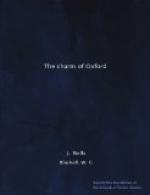But these names, and the names of many other B.N.C. worthies, hardly attain to the first rank in the annals of England’s life. The distinguishing features of the College have long been its special connection with the Palatine counties, Lancashire and Cheshire, and its prominence in the athletic life which is so large a part of Oxford’s attraction. To the connection with Lancashire, B.N.C. owes the name of its college boat, “The Child of Hale”; for John Middleton, the famous, giant, who is said to have been 9 ft. 3 in. high (perhaps measurements were loose when James I was king), was invited by the members of his county to visit the College, where he is said to have left a picture of his hand; this the ever curious Pepys paid 2s. to see. A more profitable connection between Lancashire and B.N.C. is the famous Hulmeian endowment, which is almost a record instance of the value of the unearned increment of land to a learned foundation.
The rowing men of Brasenose are as famous as the scholars of Balliol. The poet parodist, half a century ago, described her as:
“Queen of the Isis wave,
Who trains her crews
on beef and beer,
Competitors to brave,”
and the lines written in jest were a true compliment. The young manhood of England had maintained its vigour by its love of athletics, and has learned, in the discipline of the athletic club, how to obey and also how to command. Hence it was fitting that to B.N.C. should fall the honour of giving to Britain her greatest soldier in the Great War; Lord Haig of Bemerside was an undergraduate member of the College in the ’eighties of the last century, and the College has honoured him and itself by making him an Honorary Fellow.
Most Oxford colleges have their quaint and distinctive customs; that of Brasenose was certainly not inappropriate to the character that has just been sketched. Every Shrove Tuesday some junior member of the College presented verses to the butler in honour of Brasenose ale, and received a draught in return. The custom is recorded by Hearne more than two hundred years ago, and may well be older, though, as the poet of the Quatercentenary sadly confessed, its attribution to King Alfred—
“Our woven fantasy of
Alfred’s ale,
By conclusive cut of
critic dry,
Is shredded clean away.”
The most distinguished poet who thus commemorated the special drink of England and of B.N.C. was Reginald Heber, bishop and hymn-writer, who composed the verses in 1806; the compositions have been collected and published at least three times. When the old brew-house was pulled down to make room for the New Quad, the College gave up brewing its own beer, and its poets ceased to celebrate it; but the custom was revived, as has been said, in 1909. It may be permitted to a non-Brasenose man to quote and echo the patriotic expressions of the versifier of 1886:




